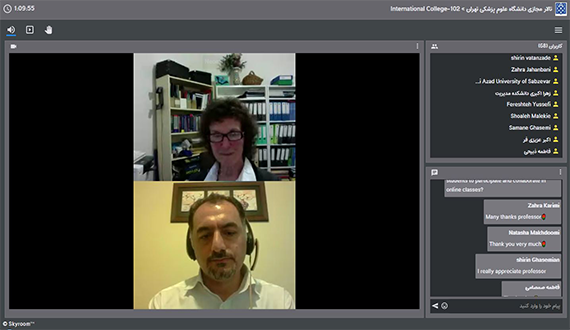5th Applied Linguistics Webinar Session Held at TUMS

The 5th session of TUMS Applied Linguistics Webinar Series I (2020) was held by the Department of Foreign Languages of Tehran University of Medical Sciences on December 5, 2020. The session, which was co-chaired by Dr. Yasin Yazdi, the director of the webinar series, and Dr. Enayat Shabani, the head of the department, was attended by professors, researchers, and students of applied linguistics from several countries. The keynote speaker was Dr. Neomy Storch, an associate professor of Applied Linguistics at the School of Languages and Linguistics, University of Melbourne, Australia, who delivered her talk on “Collaborative writing: promoting learning opportunities for language learners.”
Addressing the issue from various perspectives, the speaker primarily questioned the conventionally perceived and practiced separation of writing and speaking tasks in language classes, arguing that such a dichotomization could neither be realistic nor pedagogically beneficial. She set forth collaborative writing as a pedagogically valuable and synergistic opportunity for merging the potentialities of the two skills (i.e., speaking and writing) together. She particularly referred to the ‘negotiated interaction’ opportunities termed “languaging episodes”, meaning that when learners are engaged in co-construction of meaning and joint construction of a single text, there would be instances where the learners will engage in ‘meta-talk’: They will deliberate about language choice, will offer each other positive and negative feedback, and pool their linguistic resources to resolve language-related problems. Hence, collaborative writing tasks provide learners with opportunities to engage in higher order thinking, to co-construct new knowledge or consolidate existing language knowledge. It is needless to say that creating such an ideal learning context very much depends on a judicious designing and careful implementing of collaborative writing tasks.
Professor Storch also argued that having a sense of collective ownership for the text under construction has a very positive impact on group dynamics and individuals’ motivation to contribute to the group’s collective objectives. Some suggestions about the tasks chosen, the pre-and post-collaborative writing activities as well as computer-mediated collaborative writing were also made.
The webinar concluded with a very lively Q & A session, and a good number of appreciation emails and requests to share the slides of the presentation were received afterwards.


Your Comment :